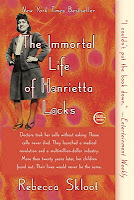In her introduction, Skloot describes how she first heard about the HeLa cells in a community college biology class when she was 16. Her teacher was explaining cell division and how normal cells can become cancer cells. He then wrote HENRIETTA LACKS on the board, and announced that Henrietta's cells helped us to understand how cancer cells work.
From the book:
Henrietta died in 1951 from a vicious case of cervical cancer…. But before she died, a surgeon took samples of her tumor and put them in a petri dish. Scientists had been trying to keep human cells alive in culture for decades, but they all eventually died. Henrietta’s were different: they reproduced an entire generation every twenty-four hours, and they never stopped. They became the first immortal human cells ever grown in a laboratory.
“Henrietta’s cells have now been living outside her body far longer than they ever lived inside it,” Defler [Skloot’s professor] said. If we went to almost any cell culture lab in the world and opened its freezers, he told us, we’d probably find millions—if not billions—of Henrietta’s cells in small vials on ice.
Her cells were part of research into the genes that cause cancer and those that suppress it; they helped develop drugs for treating herpes, leukemia, influenza, hemophilia, and Parkinson’s disease; and they’ve been used to study lactose digestion, sexually transmitted diseases, appendicitis, human longevity, mosquito mating, and the negative cellular effects of working in sewers. Their chromosomes and proteins have been studied with such detail and precision that scientists know their every quirk. Like guinea pigs and mice, Henrietta’s cells have become the standard laboratory workhorse.
“HeLa cells were one of the most important things that happened to medicine in the last hundred years,” Defler said.
Then, matter-of-factly, almost as an afterthought, he said, “She was a black woman.” He erased her name in one fast swipe and blew the chalk from his hands. Class was over.
As the other students filed out of the room, I sat thinking, That’s it? That’s all we get? There has to be more to the story.
I followed Defler to his office.
“Where was she from?” I asked. “Did she know how important her cells were? Did she have any children?”
“I wish I could tell you,” he said, “but no one knows anything about her.”
(You can read more of this excerpt from the book here.)
These questions stayed with Skloot, and inspired her to pursue this story. Over the next 20 years, she worked to find answers to her questions, spending the last ten years doing intensive research. The Immortal Life of Henrietta Lacks describes her research process, her experiences writing the book, and the many people she met and got to know.
I am very excited to hear this book is being adapted into a Young Reader’s Edition; I think my daughter would find it fascinating and touching. Rebecca Skloot’s website is wonderful, with lots of resources for teachers and students, including more photos, audio clips from Rebecca’s interview tapes, information about her writing process, video of HeLa cells dividing, and more.
Everyone I know who’s read this book feels the same way I did: Read it!

1 comment:
This was the "Big Read" in the Dayton, OH area last year. What a great book!
Post a Comment